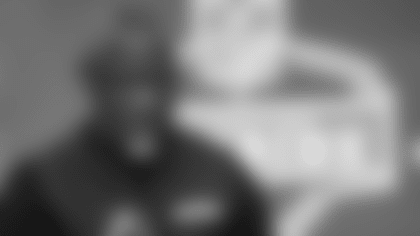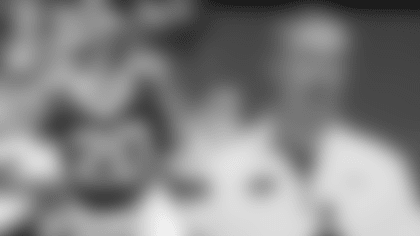Transcript of head coach Eric Mangini's news conference with the New York Jets media after Tuesday's morning training camp practice:
Acouple of pieces of housekeeping. Leon Washington is excused for today for personal reasons. Justin McCareins is going to use his pass this afternoon, I think, but that's subject to change. I never discourage on the side of not using a pass, so we'll see how that goes.
One thing that I was really happy with today in practice was the last situation. It was really in honor of Jerry Rice. We had Chad [Pennington]'s group, he's part of the Green team, down by six, very similar to Super Bowl XXIII — the San Francisco-Cincinnati situation where San Francisco trailed [16-13]. They had 3:10, and they ended up scoring a TD with 35 seconds on the clock. We scored today with two seconds on the clock. So really, time expired when the ball was in the air.
It was just good to see that lengthy drive. A lot of things came up in the course of that drive. Now if they had been stopped, they would have had to punt it away and had the three timeouts and we would have been in a four-minute situation. So a lot of things could have happened during the course of that to maintain the ball throughout the whole thing. We just don't know how that's going to go.
The other thing we did today is Chad called all the plays for his group and [Jonathan] Vilma called all the plays for his group, just to see what that looked like and get a sense for how well we can communicate and get those calls out quickly, seeing their thought processes in playing the different situations, really being able to evaluate their situational awareness without any external input. So I thought that was really good work there at the end.
It's a hot day, everybody's tired. It's about as hard as it can get and then you add the music. We're trying to make it as difficult as possible football-wise. And with that I'll open it up to questions.
On who calls the plays during those practice sessions …
Sometimes it will be Chad. Sometimes we may have Kellen [Clemens] in the game, which I may call from the sideline. Sometimes I may have Brian Daboll or Jimmy Raye or someone call it. Vice versa on defense with Jim Herrmann or Brian [Cox]. Just to let them deal with whatever it is and see what kind of awareness those guys have of the situation.
On Stacy Tutt …
Stacy's a very fluid athlete. He's a good-sized, fluid athlete. He has the quarterback background, which is good, because it's a true appreciation for the whole concept of the offense, which is positive. What I like that Stacy's done here recently is he's really shown up on special teams. He did a nice job. He did a really nice job in the Green & White Game. And that is so important. If you're not the first guy, what can you do? How many plays can you give us [if you're active for the game]? And that's always the evaluation on the 53-to-45-man breakdown.
On David Barrett …
David really has thrown together some practices here, some really good practices. And that's what I'm always looking for from each player is the consistency practice in and practice out, being the same guy. So whether it's defensively, offensively or on special teams, you know what to expect, and your teammates know what to expect from you. And that's the whole trust element of the core values: You have a reasonable expectation of performance, and everybody can count on everybody else doing their job.
On players seizing opportunities when they are presented …
I think the best way to look at the whole opportunity is what Curtis [Martin] told me. We were talking and he said that when he first got in the league, he told the front-line running backs, "Look, you guys better hope I never get in, because I'm not coming out." And of course, they laughed, you know, ha-ha-ha. Well, we all saw what happened. And I think that's an approach you want every guy to have: "If you let me in, I'm not coming out." Eventually, that door's going to open, and when that door opens, it's whether or not they can back up that thought process.
On utilizing Thomas Jones …
It's always good to have a runner who is aware of the flexibility of playing all three downs and all three different packages. You can split them out and run routes effectively. You can create some mismatches on the linebackers. Yet if you need the tough yards, you need to hunker it out, if it's a sloppy field, wet turf, whatever the case may be, he's adjustable to do that. And his skill set isn't eliminated by the conditions or the situation of the game. I really like the chemistry with him and the whole group offensively. And really, I see him interact with everybody on the team. He's not just getting to know the offense, he's really getting to know everybody. And they're getting to know him and you like that. Because we're all in this together, and you want to be able to support each other. And it's not offense first, it's all of us working the same.
On the rookies learning from the veterans …
With any of those young guys, it's really important to find veterans you can learn from, and that's another thing that I've liked. Walking by today, I see Chris Baker talking to Darian Barnes about how to most effectively block when you're in the kickoff return. That's the type of conversations that you're looking for. And Darian's going to benefit from Baker's experience. And Baker's helping the team by sharing that experience, because if Chris isn't doing it and Darian is, and we're a better return team because of it, and we're better offensively because of it, and they've shared that information, then I think that's really positive. So you want those guys to be like sponges with the veteran guys and soak up as much as they can. And you're really looking for the veteran guys to help the young guys.
That was another point of emphasis for Jerry [Rice] is just talking to veterans about how he would, when he first got in the league, every day, he was asking those guys, "What about this? What about that?" And that helped him progress. Then when he got deeper and deeper in his career, he did the same thing. He felt that was so, so important.
On Pennington calling his own plays …
Because a lot of times Chad goes in with multiple calls anyway, where he has to make a decision between what is usually two calls, but sometimes it will be two or three calls. Then there are protection issues that you've got to work out in addition to that. By giving a series or two to the quarterback, now when you're looking at it from the other team's perspective, the fingerprint is different. If you're thinking, "OK, I'm this down-and-distance and Schottenheimer is probably going to do this." Well, three or four of those down-and-distances came up where Chad Pennington was calling the plays, so now the numbers are skewed. It looks like there are breaks in the tendencies, and you don't know why there is a break in the tendency. And you've got to figure out, "Is this really the time to run this blitz?" Things don't add up as much as they did in the weeks prior.
On how frequently Pennington operated off-script with his play calling last season …
It's hard to say, because it varied by the coverage. Sometimes what he'll do, the whole play won't change, the only people that know are he and Laveranues [Coles] or he and Jerricho [Cotchery]. Everybody's running one play, you don't say anything, he signals to Laveranues or signals to Jerricho, and they're the only two that know what's going on, which is what you want. You want the defense to see what you're giving them. That's what Chad wants, that's what we want. But these two guys know, "Hey, we're going to take advantage of this weakness."
On Pennington's scramble and TD pass to Coles at the end of the long drive in practice …
We had the set play called. It really wasn't there. Then you go into your scramble rules, and that's where everybody has a designed spot based on whether Chad rolls left or rolls right. They get to a spot. Then if that breaks down, it becomes a feel thing, where Chad knows where Laveranues is going to be. And it's not like they talked about it in the huddle. Brian [Schottenheimer] calls it the me-to-you factor.
On whether Justin Miller sitting out is a setback …
No. I think this is going to come up, and it's just another step in the process, because, again, Justin's approach to everything is continuing to improve. And he's having the same approach to getting back as quickly as he possibly can. It's just another challenge, and how he meets his challenge will be another part of growth.
On how long Miller might be out …
I don't know how it's going to go. He's going to work at it, and he'll get back as quickly as he can. Anytime the flow is disrupted, you've got to get more mental reps. Get the stuff off the film. It's a little bit different, but it's part of what everybody really goes through.
On Andre Dyson's play …
He had the one rough play there in the scrimmage [Sunday]. But both of those issues, both touchdowns that scored could have been avoided by better communication. One was between the corner and the safety, one was between two corners. A lot of mistakes that you see in any game, really you can point to communication breakdowns most of the time. Things change so quickly if you're not getting that stuff out, it's very easy for one guy to think I'm playing this, the other guy's playing something totally different, and it breaks down. Now whenever the ball's thrown on the perimeter, the assumption is it's the corner's fault. But it could be any number of things.
On the amount of reps Dyson has received with the first defense …
He's been in the rotation in terms of numbers-wise, where the number of first-team reps of that group of three, they've been pretty comparable. Maybe a little bit plus or minus on a given day, but overall, they've been pretty consistent.
On Mike Nugent's improvement …
I think he's done a really good job with that. In the scrimmage the other night he had three touchbacks, and the other balls were getting deeper than they had been. And that's going to be an ongoing process of maintaining that strength during the season, maintaining the technique work throughout the season. He's really put a lot of time into that area or point of emphasis. And his overall body strength has improved as well.On what the success in 2006 means for this year …
Any time you have a measure of success, that's positive, because it reinforces the things that you're doing. The things we were doing were a lot of hard work, a lot of preparation, a lot of sacrifice — a lot of things that it takes for any team to be successful. Making that association between success and all the things that go into it, like practicing on days like today where it is extremely hot and you're tired and you're sore and you're sick of seeing the same people, all of those things. It's these days, it's stringing together a bunch of days — that's what leads to it. It's the association between success and work that is the most important lesson.
On Jonathan Vilma's performance calling plays …
Whenever you're in that spot, you're going to get second-guessed. And I'm sure Jon had his game plan. Sometimes it works out well, sometimes it doesn't. He's going to have to go back, evaluate it, and when the next opportunity comes, maybe he should have blitzed at a certain time, maybe he should have covered more. But that's part of that whole process. He needs to look at his fingerprint, what his tendencies are. And knowing Jon, he will, and he might be right now.
On having a short memory …
To me, it's not just about the next practice. It's really the next play. Because that short throw, it's done, it's in the books, you can't do anything about it. But you can do something about the next play, and the process of, 'OK, that happened, now I'm moving on, and I'm going to hit this where I'm going to lift the ball up or improve my foot work," whatever the correction is, whatever the technique is for the next play. Where you get in trouble is beating yourself up if you're going back to the huddle.
That's not just true with quarterbacks, but cornerbacks get beat on the touchdown. Otis Smith to me had one of the shortest memories ever, and that's what was great. It didn't matter. He got beat, next play he came up and challenged the same way. And that's the mark of a lot of successful players: compartmentalize that [negative play] and move on.
On his players learning to have short memories …
With Kellen and everybody else, it is a work in progress. Because you always have to deal with frustration or whatever the issues, whatever the distraction is, you have to be able to handle that and go forward. You throw a pick, it gets returned for a touchdown, hey, you're down by seven. That's it. It's just 7-0.
On what he's looking for in Kerry Rhodes …
It's continued overall development. Last year Kerry spent a lot of time on film work, which is so important, and being in the position he's in, the secondary requires a lot of communication. [It's] Continued growth in that area, which I think he's been working on throughout camp. Individual skill technique, whether it be the running game in the box or man-to-man coverage, all of the individual things. Just good awareness of where he is and good awareness of where he needs to go. He's a conscientious guy about those things.
On the impact Rhodes' progress will have on run defense …
I think collectively with run defense, it's everybody. Anytime someone that even improves, you look for improvement. But if we don't play good, sound, disciplined defense across the board, Kerry could be on the other side of the field on run support and it really won't matter if the back-side isn't as sound.














